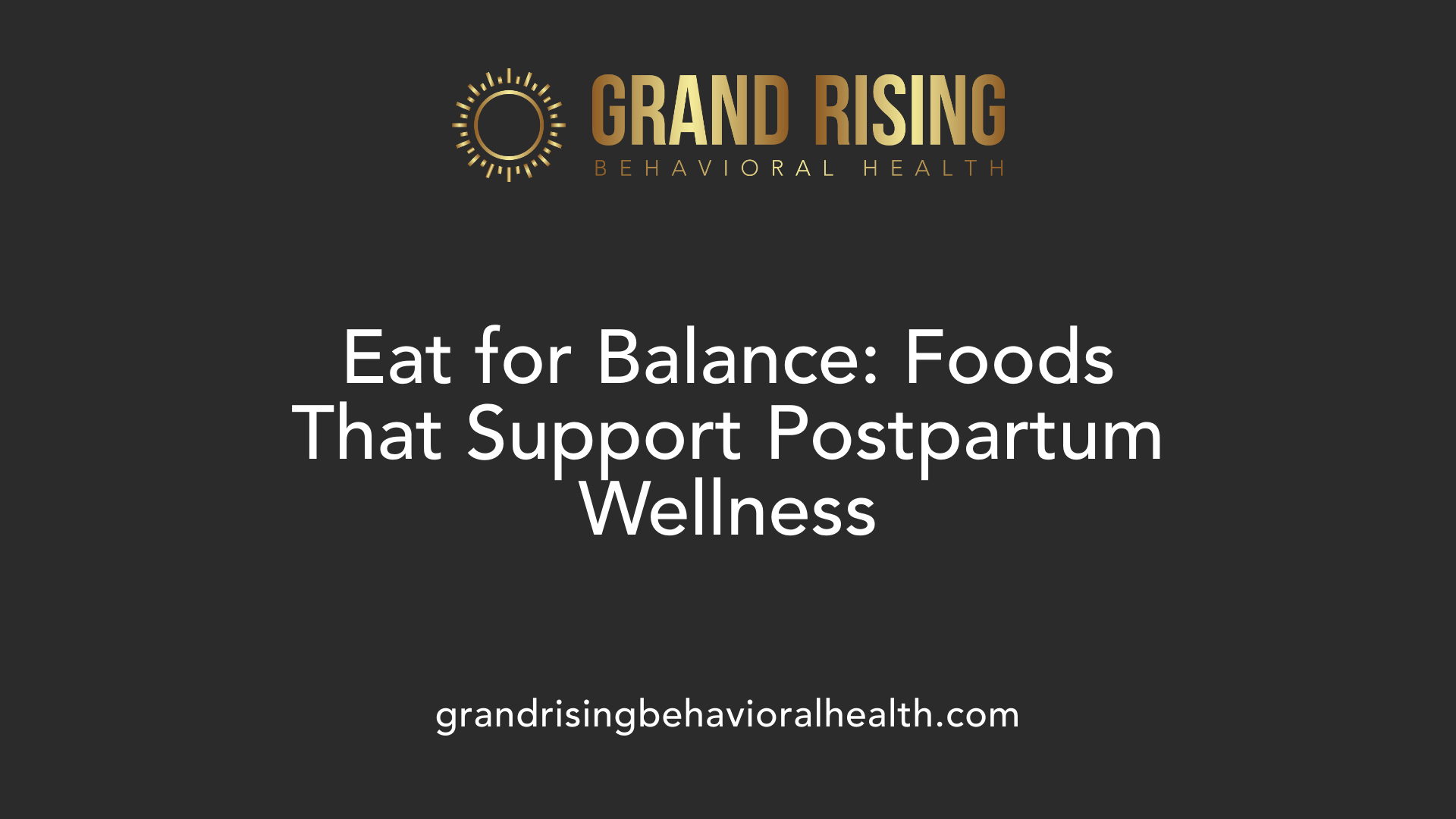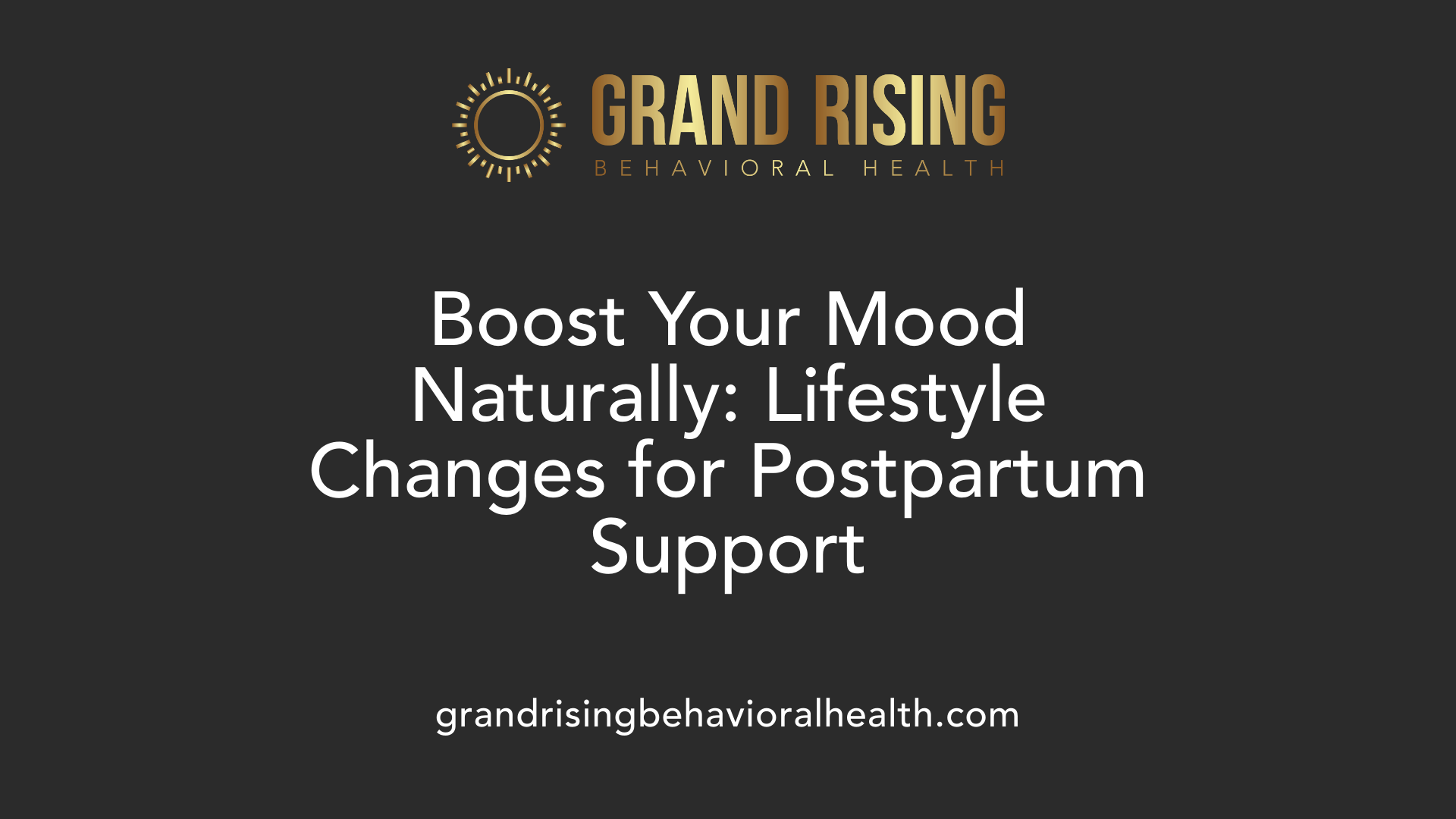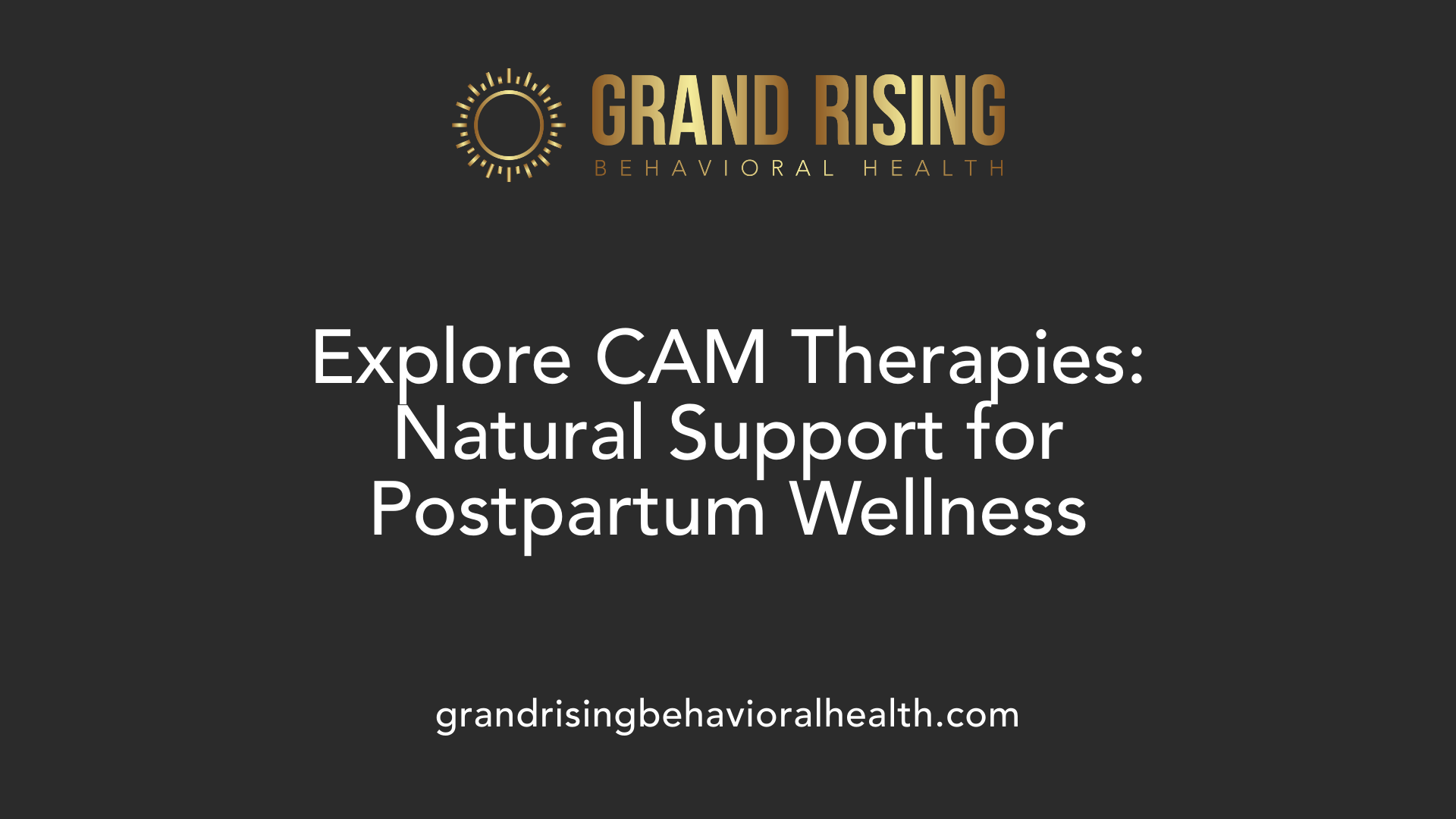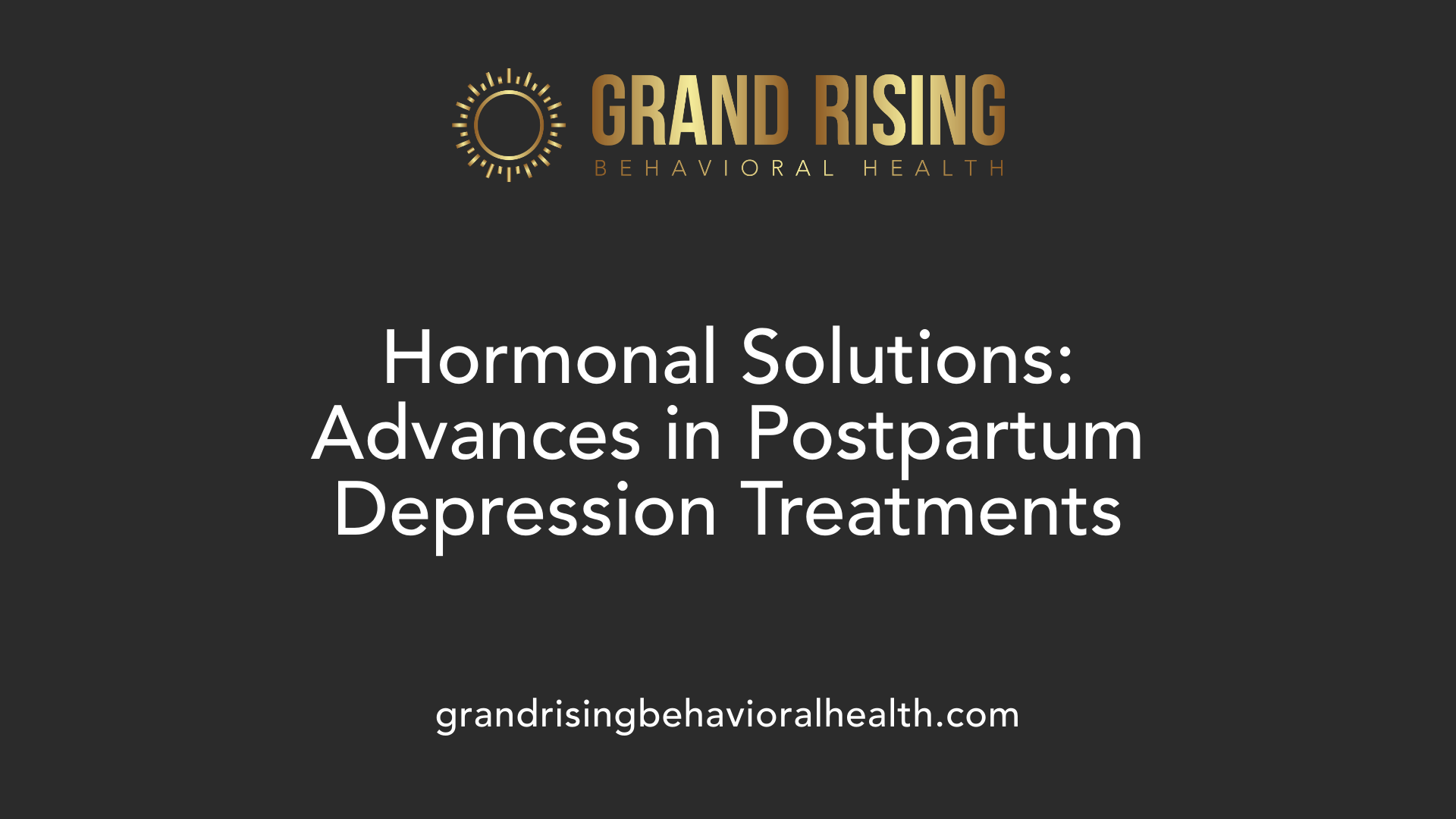Natural Remedies for Postpartum Depression
Harnessing Nature's Power to Support New Mothers

Understanding and Naturally Addressing Postpartum Depression
Postpartum depression (PPD) is a common but complex condition affecting approximately 1 in 8 women after childbirth. It manifests through symptoms like persistent sadness, fatigue, anxiety, guilt, and difficulty bonding with the baby. While traditional treatments are effective, many women seek natural and holistic methods to manage or prevent PPD. This comprehensive guide explores various natural remedies, lifestyle modifications, complementary therapies, dietary strategies, and evidence-based approaches to support mental health during the postpartum period.
Nutritional Strategies for Mental Well-Being

What nutritional strategies and dietary supplements support mental health postpartum?
Supporting postpartum mental health through nutrition involves ensuring sufficient intake of vital nutrients that influence mood, hormonal balance, and brain function. Essential nutrients like B vitamins, omega-3 fatty acids, vitamin D, and folate play significant roles in reducing the risk of postpartum depression and promoting overall mental well-being.
Dietary approaches focus on incorporating nutrient-rich foods that naturally contain these compounds. For omega-3 fatty acids, especially EPA and DHA, fatty fish such as salmon, sardines, and mackerel are excellent choices. Plant-based sources include flax seeds, chia seeds, walnuts, and hemp seeds. These fats are involved in maintaining healthy brain cell function and reducing neuro-inflammation, which has been linked to depression.
Folate, a B vitamin found largely in leafy greens like spinach, kale, and broccoli, along with legumes and enriched cereals, is crucial in neurotransmitter synthesis and mood regulation. Low folate levels are often observed in individuals with depression, and postpartum supplementation may support mood stabilization.
Vitamin D, which can be synthesized from sunlight exposure or obtained from fortified foods like dairy products and eggs, has been associated with depressive symptoms when deficient. Supplementing with vitamin D (1000 IU or more daily) during low sunlight months can be beneficial, especially for postpartum women.
B vitamins, including B6, B12, and others, are essential for energy production and nervous system health. A balanced intake through diet or B-complex supplements can help alleviate fatigue and mood disturbances.
In addition to dietary sources, supplements like fish oil (rich in EPA and DHA), folic acid, and vitamin D are sometimes recommended under medical supervision. These supplements can help address deficiencies, support brain health, and reduce inflammation.
It’s important to adopt a balanced diet that emphasizes vegetables, fruits, legumes, nuts, seeds, lean proteins, and healthy fats. Foods such as the Mediterranean Diet, which is rich in antioxidants and anti-inflammatory components, have been associated with lower depression risk.
Foods to include for postpartum mental health
| Food Group | Examples | Benefits | Additional Notes |
|---|---|---|---|
| Fatty Fish | Salmon, sardines, mackerel | Rich in omega-3 EPA and DHA | Aim for at least 2 servings per week |
| Leafy Greens | Spinach, kale, Swiss chard | High in folate and magnesium | Include daily or several times a week |
| Legumes | Lentils, chickpeas, beans | Source of folate, fiber, B vitamins | Can be added to salads, soups, or stews |
| Vegetables | Broccoli, brussels sprouts | Vitamins, antioxidants | Incorporate multiple servings daily |
| Fruits | Berries, oranges, bananas | Vitamins, antioxidants | Eat widely to benefit from diverse nutrients |
| Nuts & Seeds | Walnuts, flaxseeds, chia seeds | Omega-3s, B vitamins, magnesium | Snack or add to meals |
| Whole Grains | Quinoa, oats, brown rice | B vitamins, fiber | Choose unprocessed options |
Supplements under medical supervision
While dietary intake should be prioritized, supplements such as fish oil, folic acid, vitamin D, and B-complex vitamins can support mental health. Always consult healthcare providers before starting any supplement regimen to tailor the approach to individual needs, monitor for interactions, and ensure safe use.
In summary, a nutrient-dense, balanced diet combined with targeted supplements can significantly impact postpartum mental well-being. This approach not only supports emotional health but also promotes physical recovery after childbirth.
Lifestyle and Behavioral Modifications

What natural remedies and lifestyle modifications can help manage postpartum depression?
Managing postpartum depression involves a combination of professional treatment and supportive lifestyle changes. Natural remedies and behavioral strategies can significantly aid in alleviating symptoms and promoting overall well-being.
One effective approach is to improve your diet by increasing intake of omega-3 fatty acids, which are found in foods like salmon, sardines, flax seeds, and chia seeds. These fats are known to support brain health and mood regulation. Additionally, ensuring sufficient levels of B vitamins, especially folate, and vitamin D can contribute to mood stabilization. Foods rich in these nutrients include leafy green vegetables, beans, nuts, and fortified foods.
Engaging in regular physical activity is also beneficial. Simple activities like daily walks with the baby, yoga, or outdoor exercises for at least 30 minutes, three times a week, can boost mood through the release of endorphins. Physical activity not only fights depression but also increases energy levels and improves sleep quality.
Sleep plays a crucial role in postpartum mental health. Prioritizing adequate rest and employing strategies such as dividing night feedings with a partner or caregiver can lead to more uninterrupted sleep. Practices like maintaining a sleep-friendly environment, limiting screen time before bed, and using relaxation techniques such as diaphragmatic breathing or mindfulness exercises can further enhance sleep quality.
Stress management techniques are vital for combating anxiety and depression. Mindfulness meditation, deep breathing exercises, and body scan relaxation can help reduce stress levels. Setting aside time for hobbies, social activities, or simply resting can restore emotional balance.
Building a robust support network is equally important. Connecting with family, friends, support groups, or postpartum doulas offers emotional comfort and practical help. Sharing feelings and experiences in a supportive environment can lessen feelings of isolation and guilt.
While natural remedies and lifestyle changes are valuable, it is essential to consult healthcare professionals before making significant modifications or adding supplements to your routine. They can provide personalized advice, ensure safety—especially if you are breastfeeding—and help integrate these strategies with other treatments.
In summary, a holistic approach that combines nutritious eating, regular physical activity, adequate sleep, stress reduction, and strong social support forms a foundation for managing postpartum depression effectively. These adjustments not only improve mood but also enhance overall recovery and well-being during the challenging postpartum period.
Complementary and Alternative Medicine (CAM) Therapies**,

What complementary and alternative medicine (CAM) therapies are available for postpartum depression?
Postpartum depression (PPD) affects many women globally and can be challenging to treat solely with conventional medicine. As a result, many women explore CAM therapies, which include a variety of natural and non-invasive approaches. These therapies aim to alleviate symptoms, improve mood, and support overall well-being during the postpartum period.
One popular CAM therapy is acupuncture, which involves stimulating specific energy points on the body. Some studies suggest that acupuncture may help reduce stress and balance hormones, potentially relieving postpartum depression. However, results across different studies are mixed, and more research is required to establish its effectiveness as a standard treatment.
Massage therapy is another supportive option. It has been associated with reductions in stress hormones like cortisol and increases in mood-regulating neurochemicals such as serotonin and dopamine. Many women find massage relaxing and helpful for managing symptoms of depression and anxiety after childbirth.
Herbal supplements have gained popularity, with St. John’s Wort being the most studied. Although some evidence supports its use in mild to moderate depression, its safety during pregnancy and breastfeeding remains uncertain due to potential interactions with other medications and side effects. Because of these concerns, women should consult their healthcare providers before using herbal remedies.
In addition to herbs, certain nutritional interventions can support mental health. Omega-3 fatty acids—specifically EPA and DHA found in fish oils—have shown some promise as adjunct treatments for depression. A typical dose of around 1 gram daily is often suggested, but evidence regarding their effectiveness during pregnancy and postpartum is mixed. Omega-3s play vital roles in brain function and mood regulation, making them a valuable nutritional consideration.
Folate supplementation, especially in active forms like 5-methyltetrahydrofolate (5-MTHF), has also been linked to improved depressive symptoms. Many women experience low folate levels postpartum, which may contribute to mood disturbances. Supplementing with folate can be beneficial, particularly for women with deficiency, although more research is needed to confirm these effects.
While many CAM therapies appear promising, it is crucial to approach them with caution. Always consult healthcare providers before starting any new treatment, especially during the postpartum period. This ensures safety, avoids adverse interactions, and integrates these therapies into a comprehensive care plan.
Safety and the importance of medical advice
Many natural therapies carry potential risks if not properly supervised. Herbal remedies like St. John’s Wort can interact with antidepressants or affect hormone levels, while acupuncture and massage should be performed by qualified practitioners to prevent adverse effects.
In summary, CAM therapies such as acupuncture, massage, herbal supplements, omega-3 fatty acids, and folate provide additional options for women experiencing postpartum depression. They can serve as complementary approaches alongside traditional treatments, helping to improve mental health outcomes if used safely and under medical guidance.
| Therapy Type | Typical Use and Benefits | Considerations |
|---|---|---|
| Acupuncture | Stress relief, hormone regulation, relaxation | Mixed evidence, need for qualified practitioners |
| Massage Therapy | Reduces stress hormones, boosts mood | Safe when performed by certified therapists |
| Herbal Supplements | Mood improvement, mild depression symptoms | Potential drug interactions, need for supervision |
| Omega-3 Fatty Acids | Brain health, mood regulation | Efficacy during postpartum not conclusively proven |
| Folate (5-MTHF) | Depression symptoms, especially with deficiency | Confirm deficiency before supplementing |
By understanding these therapies and consulting healthcare providers, women can make informed decisions on incorporating CAM approaches into their postpartum mental health care.
Herbal and Nutritional Supplements**,
What nutritional strategies and dietary supplements support mental health postpartum?
Supporting postpartum mental health often involves nutritional strategies that focus on addressing common deficiencies and increasing nutrient intake known to influence mood regulation. Key nutrients include B vitamins, omega-3 fatty acids, vitamin D, and zinc. Deficiencies in these can elevate the risk of postpartum depression, making their adequate intake particularly important during this period.
Incorporating nutrient-rich foods is the primary approach. Foods high in omega-3 fatty acids, such as fatty fish like salmon, sardines, and mackerel, provide EPA and DHA, which are associated with antidepressant effects and improved brain health. Leafy greens, legumes, and fortified cereals supply B vitamins, essential for neurotransmitter synthesis and stress regulation.
Vitamin D, often deficient postpartum, can be boosted through sunlight exposure and supplements, especially during months with limited sunlight. Adequate zinc intake, found in nuts, seeds, and whole grains, plays a role in mood stabilization.
A diet emphasizing vegetables, fruits, lean proteins, and healthy fats, such as the Mediterranean diet, can decrease inflammation and oxidative stress, which are linked to depression.
To optimize recovery and mental well-being, it’s prudent to limit processed foods, red meats, added sugars, and processed snacks, which have been associated with increased depression risk.
Sometimes, dietary supplements are recommended as adjuncts to a healthy diet, especially if deficiencies are identified or if dietary intake isn’t sufficient. Examples include fish oil supplements rich in EPA and DHA, vitamin D supplements, B-complex vitamins, and zinc.
However, supplements should only be used under medical guidance to ensure safety, appropriate dosing, and to avoid interactions with other medications or health issues.
Overall, a balanced diet combined with targeted nutritional supplements can be a powerful component of postpartum mental health management, complementing therapies and counseling.
Physical Therapies and Supportive Practices,
What non-pharmacological approaches like exercise, acupuncture, or massage can support postpartum mental health?
Supporting mental health after childbirth involves various natural and holistic strategies. Exercise stands out as a beneficial activity; engaging in at least 30 minutes of moderate activity, such as walking or yoga, three times a week can help reduce symptoms of depression and boost overall energy levels.
Acupuncture has shown promise in alleviating postpartum depression symptoms by stimulating specific energy points to promote relaxation, balance hormones, and reduce anxiety.
Massage therapy is another supportive practice, capable of decreasing stress hormones like cortisol while increasing mood-enhancing chemicals such as serotonin and dopamine.
In addition to these physical therapies, other supportive approaches include bright light therapy, which can improve seasonal and non-seasonal depression, and mind-body practices like mindfulness meditation and deep breathing exercises.
Support from these therapies is often complemented by psychotherapeutic interventions such as cognitive-behavioral therapy (CBT) and interpersonal psychotherapy (IPT). These therapies address emotional and relational issues that contribute to postpartum depression.
Combining physical therapies with emotional and social support enhances overall outcomes. Early intervention with supportive counseling and psychoeducation helps women better understand and manage their mental health challenges.
Overall, an integrated approach—blending exercise, physical therapies, psychotherapy, and social support—can significantly improve mental health in postpartum women, helping them recover and bond with their babies more effectively.
Hormonal and Pharmacological Interventions

What is the evidence and safety profile of natural and alternative therapies for postpartum depression?
The landscape of postpartum depression (PPD) treatment includes not only conventional clinical approaches but also natural and alternative therapies. The effectiveness and safety of these therapies can vary, with some showing promising benefits while others lack substantial scientific validation.
Omega-3 fatty acids, particularly EPA and DHA found in fish oil, have been extensively studied for their role in brain function and mood regulation. Evidence suggests that they may have some antidepressant effects, especially when used as an adjunct alongside traditional therapies. However, their capacity to prevent or treat postpartum depression remains inconclusive, and they are generally well tolerated.
Folic acid supplementation is another dietary intervention with potential benefits. Since low folate levels are associated with depression and they support neural health, supplementation during pregnancy and postpartum is recommended. While some studies show that folic acid can improve depressive symptoms when used as an adjunct, research evidence specific to postpartum depression is still developing.
Bright light therapy, known for managing seasonal affective disorder, has shown some promise in antenatal depression, with minimal risks involved. Similarly, mind-body practices such as massage therapy and exercise have demonstrated positive effects on mood and stress levels. Regular physical activity can help boost mood by increasing endorphin levels and reducing cortisol, adding a safe complementary measure.
Herbal remedies like St. John’s Wort are used by some for mild to moderate depression; however, they lack robust evidence and safety data, especially during pregnancy and breastfeeding. Animal studies and limited human data indicate potential risks with these herbs, hence caution and professional guidance are highly recommended.
Acupuncture as an alternative therapy is promising yet remains inconclusive. Its safety profile is favorable, but further high-quality studies are necessary to confirm its effectiveness for postpartum depression.
In general, these nonpharmacological approaches tend to have minimal side effects when properly administered. Nonetheless, it is critical to consult healthcare providers before beginning any alternative remedies, particularly in the delicate postpartum period.
Overall, natural and complementary therapies can serve as useful adjuncts to conventional treatment, improving overall well-being and mood stability. They should, however, be integrated carefully within a comprehensive treatment plan overseen by healthcare professionals to ensure safety and efficacy.
Below is a summary table highlighting various natural and alternative therapies, their evidence status, safety considerations, and typical use cases:
| Therapy | Evidence Level | Safety Profile | Typical Use Cases | Additional Notes |
|---|---|---|---|---|
| Omega-3 Fatty Acids | Moderate | Well tolerated | Adjunctive support, mental health | Consider during pregnancy and postpartum |
| Folic Acid | Strong for deficiency | Safe | Adjunct in depression, neural development | Dose as recommended during pregnancy/postpartum |
| Bright Light Therapy | Promising but limited | Very safe | Seasonal and antenatal depression | Use under medical supervision |
| Massage Therapy | Supportive evidence | Safe | Stress relief, mood enhancement | Best as complementary therapy |
| Exercise | Extensive evidence | Safe | Mood improvement, physical health | Tailor intensity for postpartum women |
| Herbal remedies (e.g., St. John’s Wort) | Limited and mixed | Caution advised | Mild to moderate depression | Not recommended during pregnancy/lactation without guidance |
| Acupuncture | Mixed results | Very safe when performed by certified practitioners | Stress and depression | Needs more research for postpartum use |
In essence, although some natural therapies show potential, they should complement, not replace, evidence-based treatments for postpartum depression. Engaging healthcare providers in decision-making ensures safe and effective management tailored to individual needs.
Hormonal Fluctuations and Innovative Treatments**,
What is the impact of hormonal changes after childbirth on postpartum depression?
Postpartum depression (PPD) is often linked to rapid hormonal shifts following childbirth. One significant change is the sharp decline in levels of hormones such as progesterone and estrogen. This hormonal plunge can influence brain chemistry, mood regulation, and emotional stability. For example, the withdrawal of progesterone after delivery is believed to trigger some of the physical and emotional symptoms associated with PPD. These hormonal fluctuations can also affect neurotransmitter systems, including GABA, which plays a role in anxiety and mood.
Addressing these hormonal shifts is a focus of recent medical advancements, aiming to restore hormonal balance and alleviate depression symptoms. Treatments that target these neurochemical pathways are emerging as promising options.
Brexanolone infusion and regulatory approval
Brexanolone (Zulresso) is a groundbreaking medication specifically approved by the FDA in 2019 for postpartum depression. It is administered as a continuous intravenous infusion over 60 hours during a hospital stay.
Brexanolone works by mimicking allopregnanolone, a neurosteroid derived from progesterone that influences GABA-A receptor activity. Since the drop in allopregnanolone after childbirth is linked to depression, supplementing it helps stabilize mood and reduce symptoms.
The safety profile of brexanolone is generally positive, but it requires hospital supervision due to potential side effects such as sleepiness and dizziness. Close monitoring during infusion ensures patient safety.
Zuranolone as an oral alternative
Zuranolone (brand name Zurzuvae™) is an innovative oral medication recently approved by the FDA as the first pill for postpartum depression. It is a synthetic analog of allopregnanolone, designed to provide similar neurosteroid activity but with greater convenience.
Administered once daily for 14 days, zuranolone has demonstrated rapid reduction in depression scores—often within just three days of starting treatment. This rapid onset offers a significant advantage over traditional therapies.
Clinical trials show that women taking zuranolone experience notable mood improvements, with a manageable side effect profile including sleepiness and dizziness. Because it crosses into breast milk, breastfeeding women need to consult healthcare providers before use.
Neurosteroids and GABA-A receptor modulation
Both brexanolone and zuranolone are part of a class of treatments known as neurosteroids, which modulate GABA-A receptor activity in the brain. GABA is the primary inhibitory neurotransmitter, and its enhancement can have calming, anti-anxiety, and antidepressant effects.
This mechanism is especially relevant postpartum because hormonal dips reduce positive GABAergic signaling, contributing to mood disturbances. By mimicking natural neurosteroids, these medications help restore balance, offering targeted relief for postpartum depression.
Evidence and safety profile of natural and alternative therapies
The evidence for natural and alternative therapies for postpartum depression varies, with some showing potential benefits and others lacking robust data. Omega-3 fatty acids and folic acid may offer modest support as adjuncts, especially given their general health benefits; however, their efficacy specifically for postpartum depression remains inconclusive.
Bright light therapy, massage, and exercise have demonstrated some antidepressant effects with favorable safety profiles, but more research is needed to confirm their effectiveness in postpartum populations.
Herbal remedies like St. John’s Wort and traditional practices like acupuncture have mixed or limited evidence and should be used cautiously due to safety considerations.
Overall, while some CAM therapies may complement standard treatment, consulting healthcare providers before use is essential, and they should not replace evidence-based interventions for postpartum depression.
More information search query
For further details on hormonal treatments and neurosteroids in postpartum depression, search terms like "Postpartum hormonal treatments and neurosteroids" can provide recent studies, clinical trials, and reviews on advancements in this field.
Empowering Mothers Naturally
Navigating postpartum depression through natural remedies and lifestyle modifications offers a compassionate and empowering path for new mothers. While these methods can significantly complement traditional treatments, it is crucial to work with healthcare providers to tailor strategies safely and effectively. Emphasizing nutrition, physical activity, social support, and adjunct therapies such as acupuncture, massage, and mindfulness can foster emotional resilience and promote recovery. Continued research into safe, natural, and accessible options promises further advances. Ultimately, a holistic approach rooted in natural remedies can help new mothers regain balance, nurture their well-being, and embrace their journey into motherhood with hope and strength.
References
- Are There Natural Remedies for Postpartum Depression? - Healthline
- [PDF] Non-Drug Ways to Help Treat Postpartum Depression
- Treating postpartum depression with complementary or alternative ...
- Postpartum depression - Diagnosis and treatment - Mayo Clinic
- Postpartum Depression - Natural Treatment Options
- Postpartum Depression: Causes, Symptoms & Treatment
- Discover Natural Remedies for Postpartum Depression
- The Top 5 Natural Ways to Prevent Postpartum Depression
- Natural Remedies for Postpartum Depression & Anxiety
More Resources
A team ready to start your journey.
Get in touch — today.
We are a safe space – a haven for exceptional individuals to receive discreet, personalized, in-person treatment and care.
.avif)










